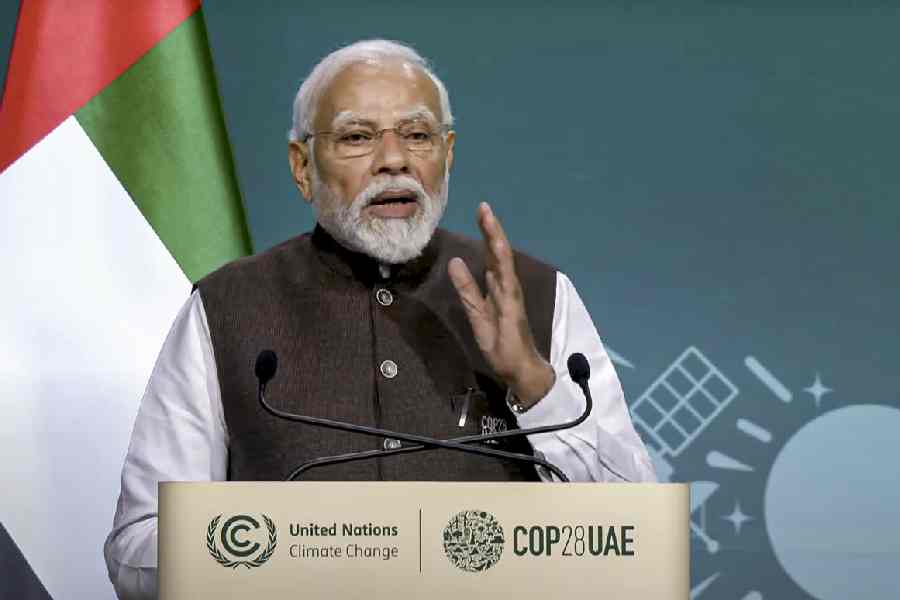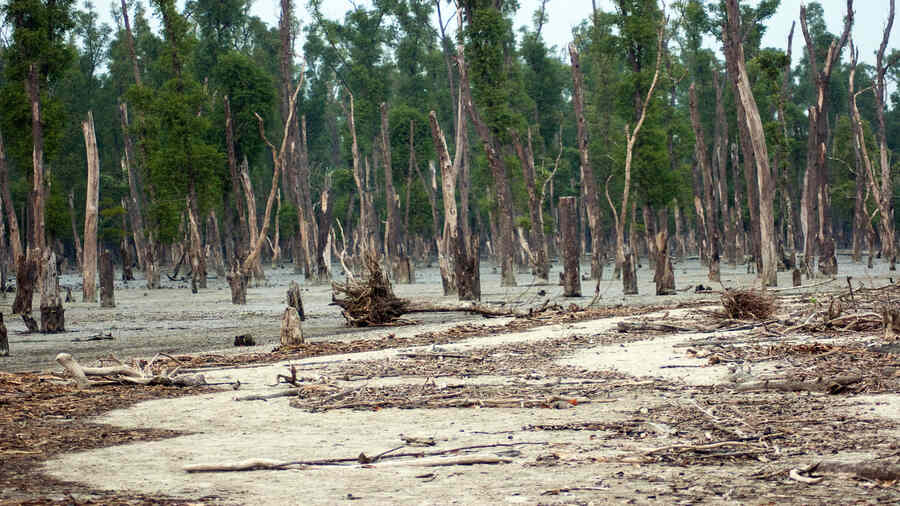On Friday, Prime Minister Narendra Modi sought to portray himself as a foremost global leader in countering climate change as he paraded his “successes” to combat global climate change in front of nearly 200 leaders across the world, and also offered to host the COP33 in India, five years from now, in 2028, during his talks at high-level segment in Dubai COP.
Climate experts consider the proposal to be a masterstroke to carry forward its successful G20 legacy where India was in the chair till recently. India, earlier, only once held climate COP in 2002 but several tried to punch holes in his claim reminding not too encouraging environment performance at the domestic level. Incidentally, while India was ranked at the bottom – 180th – in global environment rankings last year, its climate performance ranking was found to be within the top global countries, eighth overall.
The 2028 summit, next Asian COP in schedule, would be a critical one as the next round of global stock take (GST) review, after an ongoing COP, is scheduled that year according to the Paris agreement. Though Prime Minister Modi has made an offer that has to go through UN protocol and procedures, climate experts present at the COP feel that the scheduling must have been unofficially discussed before the Indian Prime Minister made that offer on a global platform.
In his speech, which had run over 10 minutes, the Indian Prime Minister also tried to respond, albeit indirectly, to the allegation from a section of global north about promoting coal, and hence, carbon emissions, by patting himself on success in reducing carbon emissions.
The Prime Minister has pointed out that India contributes less than 4 per cent to global carbon emissions, and is one of the few countries which is on track to achieve its nationally determined contribution (NDC). The NDCs are considered pivots to keep global emission within a manageable limit. The Paris agreement vouched to keep global temperature rise within 2 degrees Celsius, preferably 1.5 degree Celsius, to minimise climate change-induced global impacts, but recent global reports indicate that the 1.5 degree target is likely to be breached soon unless all countries start making more ambitious and deep carbon emission cuts.
Modi also sought to become the voice of the global south by demanding that all developing countries get a fair share in the carbon budget.
India, a model, to counter climate change: PM
“India has presented a fine model of balancing economy and ecology … our share of global carbon emission is less than 4 per cent while we have 17 per cent global population,” said the Prime Minister, who was part of the inaugural session, and spoke just after the opening speech of COP 28 president and UNFCCC secretary general.
“We are within the select global economies which are on course to achieve its NDC target,” said the PM, reminding that India has achieved emission intensity reduction target 11 years before the scheduled time-frame, while the non-fossil fuel target was achieved nine years before time. “We are not stopping at this and aim to bring emission intensity down by 45 per cent, and increase the share of non-fossil fuel capacity to 50 per cent and will achieve net zero by 2070,” added Modi, reiteration of his 2021 Glasgow summit statement that many see as a response to recent criticism mounted by a section of global north about India’s coal expansion policy.
Proposed India’s green credits to go global, highlights G20 success
Modi claimed that under India’s G20 presidency, climate change got high priority and a green development pact for a sustainable future could be stitched through a consensus. He also said that India played a key role in trebling the renewable energy production globally, focused on hydrogen as an alternate fuel and launched global biofuel alliance and took credit for increasing the global finance commitments to reach trillions from billions.
“In Glasgow, I presented before you the vision of mission LiFE and now as per International Energy Agency study, this approach can help us reduce carbon emissions by 2 billion tonnes annually by 2030,” said Modi before proposing another new initiative to be taken up at the global level.
“Today, I call for another pro-planet, proactive initiative on green credits, a mass campaign that goes beyond the commercial mindset associated with carbon credits; it focuses on creating sinks through public participation,” said Prime Minister.
Green Credit Program (GCP), notified on October 13, 2023 in India, is an innovative market-based mechanism designed to incentivise voluntary environmental actions across diverse sectors, by all stakeholders including individuals, communities, and private sector industries.
COP proposal, a master stroke; but everything is not hunky dory
“PM Modi’s offer to host the UNFCCC COP33 in five years is a good diplomatic masterstroke given the mood of the climate discussions in Dubai,” said Aarti Khosla, director, Climate Trends, adding that “the fact that the podium was offered to Prime Minister Modi is testimony to India’s changing geopolitical clout and linked to its long-standing economic partnership with the UAE”.
Harjeet Singh, head of global political strategy, Climate Action Network International, said that India’s energy growth story can serve as a powerful example for the world.
Sanjay Vashist, director of Climate Action Network South Asia, also hailed the COP proposal as “significant” but pointed out that India has to walk-talk its commitments and take actual leadership on the ground in cutting fossil fuels. “The COP33 in 2028 is critical as it is the next Asian COP and also the time for next review of global stock-take after this year as per the Paris agreement,” reminded the expert.
Jairam Ramesh, former Union environment minister and Congress spokesperson, countered Modi’s statement qualifying it “yet another of his trademark falsehood” and accused the Modi government of diluting environmental laws and weakening the legal governance linked to environmental issues.
Ramesh also sought to link the recent Uttarkashi disaster with the Modi government’s environment and climate performance. The tunnel collapse in Uttarkashi that had trapped 41 workers for 16 days was “only a symptom of the larger malaise”, Ramesh said in his statement, which outlined concerns of a major section of the green lobby.
“Timelines for hydro and mining project clearances have been arbitrarily extended, major project types have been removed from central government clearance, public hearings and participation have been skipped. In eco-sensitive areas like the Himalayan region, the Modi government has illegally bypassed environmental impact assessment by splitting (large) projects into small segments,” reads Modi’s statement.
A climate expert from the country, at Dubai now, pointed out that the tall claims of the Prime Minister on the global platform needs to have a link to the realities back home. “Global reports say that India is one of the toppers in terms of climate risk, both at mortality scale as well as financial loss. Huge populations in several states particularly Bihar, Uttar Pradesh, Assam and West Bengal are at the forefront of frequent climate disasters; but what are we doing at national level to combat the trend; what is our national budget allocation in countering climate risk?” asked the expert, not wanting to be named.

